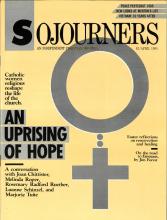Ten years ago this month, on April 30, 1975, the war in Vietnam officially ended when the U.S.-backed puppet government in Saigon collapsed and the Provisional Revolutionary Government of Vietnam assumed power. But, in reality, there were always two Vietnam wars: one waged against the Vietnamese and the other against the opposition on the home front. Ten years later both of those Vietnam wars continue in new guises.
Over the last 10 years, the United States has waged a campaign of unremitting hostility against Vietnam. In the wake of our military defeat, we have continued the war by every available political and economic means. The reconstruction aid and diplomatic recognition promised in the Paris treaty of 1973 have never materialized. A U.S. trade embargo has hampered Vietnam's economic recovery, and the United States has supported China's political and military offensives against Vietnam. The United States has even refused the minimal humanitarian gesture of helping the Vietnamese locate and disarm the tons of unexploded mines and bombs that riddle their countryside.
The continuing war at home consists of brazen attempts to rewrite the history of the Vietnam war with an eye toward proving that the U.S. government was right. This campaign has been most recently in the headlines as a result of Gen. William Westmoreland's now-aborted libel suit against CBS. It has also been noticed in President Reagan's occasional utterances to the effect that the U.S. war in Vietnam was "a noble cause." But the war for history also rages on a somewhat more serious, intellectual level in books and seminars and in the pages of neo-conservative and neo-liberal journals.
Read the Full Article

